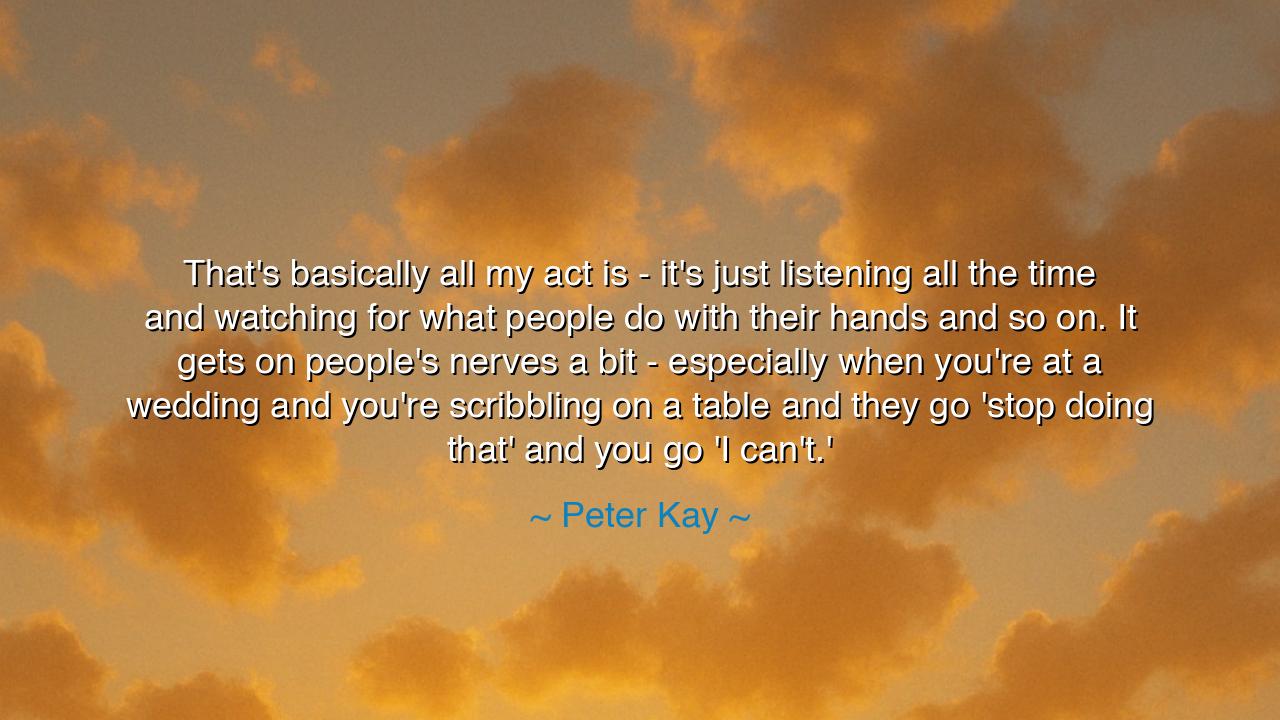
That's basically all my act is - it's just listening all the
That's basically all my act is - it's just listening all the time and watching for what people do with their hands and so on. It gets on people's nerves a bit - especially when you're at a wedding and you're scribbling on a table and they go 'stop doing that' and you go 'I can't.'






Hearken, O children of perception and craft, to the words of Peter Kay, who unveils the secret of his art. He speaks of how his comedy is born not from mere invention, but from listening and observing, watching closely the small gestures and subtle movements of others—the way they use their hands, the expressions on their faces, the rhythms of their speech. Even at joyous occasions like a wedding, he cannot silence this instinct, scribbling notes while others feast and dance, though it sometimes annoys those around him. In this confession lies a profound truth: the artist’s gift is also his burden.
The act of observation has long been revered as a sacred tool of understanding. In ancient courts, philosophers and scribes trained themselves to study human behavior with unwavering attention. Aristotle himself spoke of comedy as a reflection of life’s everyday follies, born from watching the simple actions of ordinary people. So too does Peter Kay follow this ancient lineage, transforming the mundane into the sublime, capturing truth through the lens of humor.
Yet such attentiveness can set the artist apart from others. Where most see only the surface of a gathering, the observer perceives hidden stories, the unspoken language of gestures and habits. This gift is both a blessing and a curse. Consider Leonardo da Vinci, who filled countless notebooks with sketches of people he watched in marketplaces and celebrations. Like Kay, he was often misunderstood, his ceaseless scribbling drawing curious stares, for those around him could not see the visions taking form in his mind.
The wedding itself serves as a symbol of this tension. A wedding is meant for celebration and connection, yet Kay’s role as a humorist compels him to remain slightly apart, ever studying, ever noting. His inability to stop, even when asked, reflects the nature of true vocation—a calling that cannot be silenced by social expectation. The ancients taught that those marked by the muses must follow their path, no matter how odd or inconvenient it may appear to others.
O seekers of wisdom, understand this: every act of creation begins in silence and observation. The world’s greatest insights arise from those willing to watch closely, to notice the patterns others overlook. Though their ways may perplex or even irritate, their work illuminates the shared truths of humanity, bringing laughter, healing, and understanding.
Thus, O children, let this lesson guide you: cultivate the art of seeing and listening, for in the smallest gestures lie the seeds of great stories. And when the observer seems distracted or distant, know that they are weaving, even in that moment, a tapestry of understanding that will one day return to the world as wisdom, laughter, and light.






NPNguyet Phan
Peter Kay’s description of his act reminds me of how comedians often draw inspiration from everyday moments. It’s funny that his habit of observing people’s actions can annoy others, especially at weddings. It makes me wonder—how do comedians manage to balance their craft with social etiquette? Is it difficult to be constantly 'on' and observing everything, even when you’re supposed to be a guest at an event?
TTThuy Thanh
It’s interesting to hear Peter Kay talk about his unique approach to comedy, where even the smallest gestures, like what people do with their hands, inspire his act. I can imagine how, at a wedding or similar social setting, his constant observations might get on people's nerves. Do you think comedians have a responsibility to turn off their 'observational mode' in certain social situations, or is it just part of who they are?
BLBao Linh
Peter Kay’s comment about observing people's hands and behaviors at weddings gives a glimpse into the mind of a comedian. I can see how someone who makes a living from these observations might get caught up in little details that others don't notice. But it sounds like it could be frustrating when people tell him to stop! Do you think his behavior is just a part of his process, or does it sometimes cross boundaries in social settings?
TKNguyen The Khai
Peter Kay's perspective on observing people's behavior is fascinating. It’s interesting how he uses his observations as a key part of his act. The fact that his actions can sometimes annoy people, like scribbling at a wedding, shows how deeply he’s tuned into the details of human behavior. I wonder, do you think that being so aware of others' actions can sometimes make it hard to just relax and enjoy a moment, especially at social events?